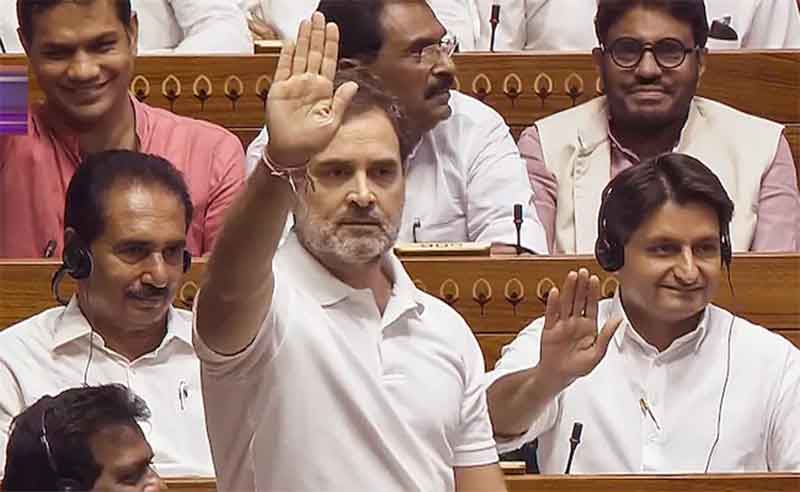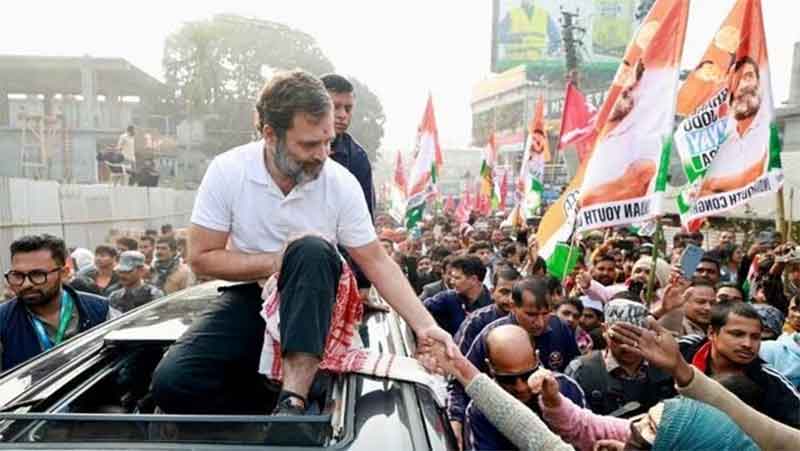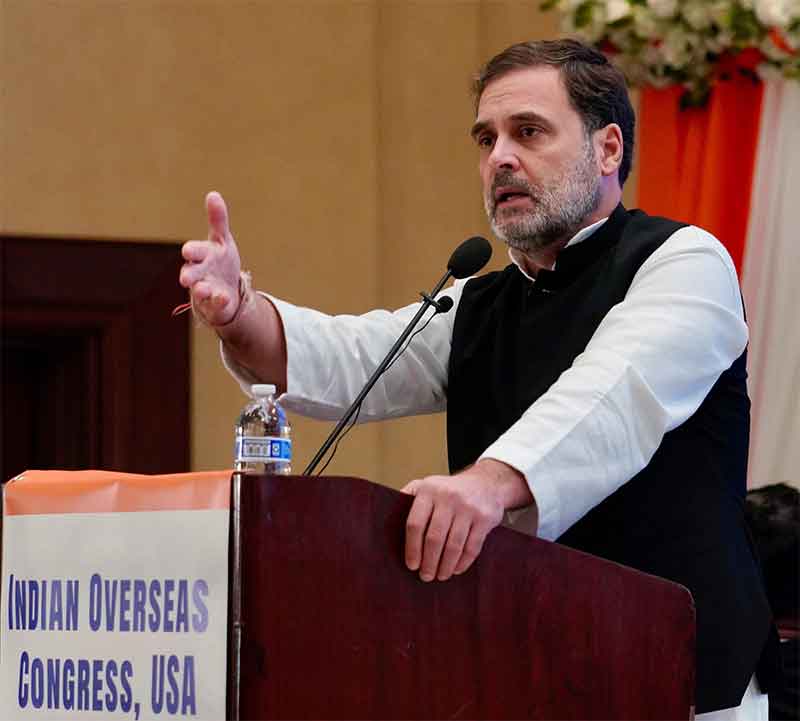
Recent elections in India may have given the ultra-right party, the BJP, another chance to govern the country. Still, they have rewarded the opposition alliance for coming together on a single platform and fighting for the rule of law.
While watching the debate, Anil Sharma, a YouTuber from Delhi, said that ‘voters got a glimpse of a democratically run Parliament for the first time and had to wait for a decade to get their issues raised by their representatives. However, time will tell whether the government is redressing the issues’.
In the first session of the new parliament, the faces of the ruling party were hanging after seeing the fiery speeches of the leaders of the Congress-led opposition alliance. Still, it provided the best entertainment to the masses after a long time. The people breathed a sigh of relief at the open and straightforward talk by opposition parliamentarians.
While Rahul Gandhi, the parliamentary leader of the alliance, had lashed out at Prime Minister Narendra Modi and his party’s national policies, Samajwadi Party leader Akhilesh Yadav has eloquently hurled several poetic missiles at the BJP. There was no retaliatory missile from the ruling party. Then, the Trinamool Congress leader Mahua Moitra settled the scores of her sacking in the last Parliament by taking a direct hit at the Prime Minister, Narendra Modi.
There is a general feeling that for the last ten years, the Hindutva party, BJP, has established a monopoly in the parliament, where the opposition barely gets a chance to speak. More than a hundred opposition leaders were suspended to suppress their voices and kept away from the proceedings of the House of Representatives.
After seeing the new parliament’s first session, everyone felt the opposition leaders’ emotions were ready to burst; they wanted to take complete revenge for ten years of monopoly and coercion from the BJP.
Speaking about President Murmuru’s inaugural speech, when Opposition leader Rahul Gandhi started his verbal attack on the BJP’s policies towards farmers, students, minorities, Agniveers, and Adivasis, it boosted the morale of leaders of other political parties. They all took the BJP to task on every one of its policies, be it Manipur, NEET exams, or communal politics that has polarised the country’s population according to the opposition.
The debate in Parliament was routine, and MPs were used to talk or keep silent. It didn’t happen in the last two parliaments. This time, Rahul Gandhi changed the tone of the discussion by painting a new picture of the Parliament that placed the BJP in a defensive position. It seemed a sort of a warning to the BJP that the time of dictatorial tactics has been over and it will not work anymore. The time has come to listen to the opposition, and the ruling party must remain silent. The opposition endorsed their leader and responded fiercely as a protest to the ruling party.
In an attempt to suppress Rahul’s voice, the speaker was blamed for switching off the microphone several times, which drew a strong reaction from the opposition.
Some analysts believed that during the recent election campaign, just as Prime Minister Narendra Modi incited anti-Muslim sentiments and fueled the Hindutva movement to garner Hindu votes, in the same way, Rahul Gandhi cast iron by displaying Lord Shiva’s photo in the House. He used the diamond cuts diamond policy and attacked the same Hindu philosophy the BJP has been doing for the last few decades. This blow hit the target.
Rahul Gandhi said that ‘Hindu religion does not spread violence or hatred, but those who do so do not belong to Hindu religion. What the BJP is doing to garner votes is against the Hindu philosophy. Soon, the BJP accused Rahul of maligning Hinduism and started a campaign on social media for hurting the majority community. The social media campaign failed.
Referring to Sikhism and Christianity, the moment Rahul Gandhi mentioned Islam and said that Islam emphasises that one should never live in a state of fear and dread of anybody, the BJP leadership got too angry and asked the speaker to stop Rahul’s speech. Prime Minister insisted on deleting a few parts of Rahul’s speech.
This is perhaps the first time in BJP rule that the Indian media has been forced to broadcast the speeches of the opposition leaders. In contrast, social media has been abuzz with memes and viral videos of Rahul Gandhi and other leaders.
The Speaker of the Parliament immediately realised that Rahul Gandhi was trying to undermine the BJP’s Hindutva policy by portraying himself as a Hindu; he immediately warned against showing the picture of Lord Shiva. It was a direct trespassing in their uncharted territory as the BJP considers itself the sole guardian of Hinduism.
This time, the opposition, including the Congress’s attitude, was completely different and so harsh and furious that the opposition slogans did not stop for more than two hours during the Prime Minister’s speech. Due to the cacophony, he had to wear headphones while giving a long speech. He also kept drinking water, which showed his nervousness.
According to Ravindra Ratel, a political observer from Mysore, the major democracies of the world are currently on the way to decline, including the United States, the United Kingdom, France, and India. All these democracies are facing internal political chaos, a possible civil war in the United States, and extremism in the United Kingdom and France. At the same time, the wave of Hindutva in India has caused considerable public concern among communities. He says that ‘Indian voters recently have revived the spirit of democracy to some extent, while the extremists are dominating the French elections, the British elections won by Labour part has given more than twelve per cent votes to a far-right political party. This shows how much extremism has been embedded in society across the globe. Who are not aware of the results of the fake election process in Bangladesh and Pakistan that has translated into internal chaos and simmering tension. Amid this volatile situation, it is a welcome step to see the strength of opposition in India and the return of parliamentary democracy to its original form.
Subscribe to Our Newsletter
Get the latest CounterCurrents updates delivered straight to your inbox.
For the first time in many years, some Muslim members openly accused the Hindutva party of allowing mob violence in the streets, which has claimed the lives of dozens of Muslims. One of the members spoke about the poor representation of Muslims in Parliament. It is less than four per cent. ‘By dividing various communities and inciting hatred against Muslims, the extremists have created such an atmosphere of fear in the country that the minorities were feeling disenfranchised and uncertain future’.
Only secular leadership can end this hopelessness and uncertainty. Perhaps Rahul Gandhi has to initiate and assure minorities of protection, equality, and representation in institutions.
Though the opposition alliance has exhibited its resolve to speak for the people, it remains to be seen whether it will convince the BJP to abandon its Hindutva policy .
Nayeema Ahmad Mahjoor is an author and Journalist















































